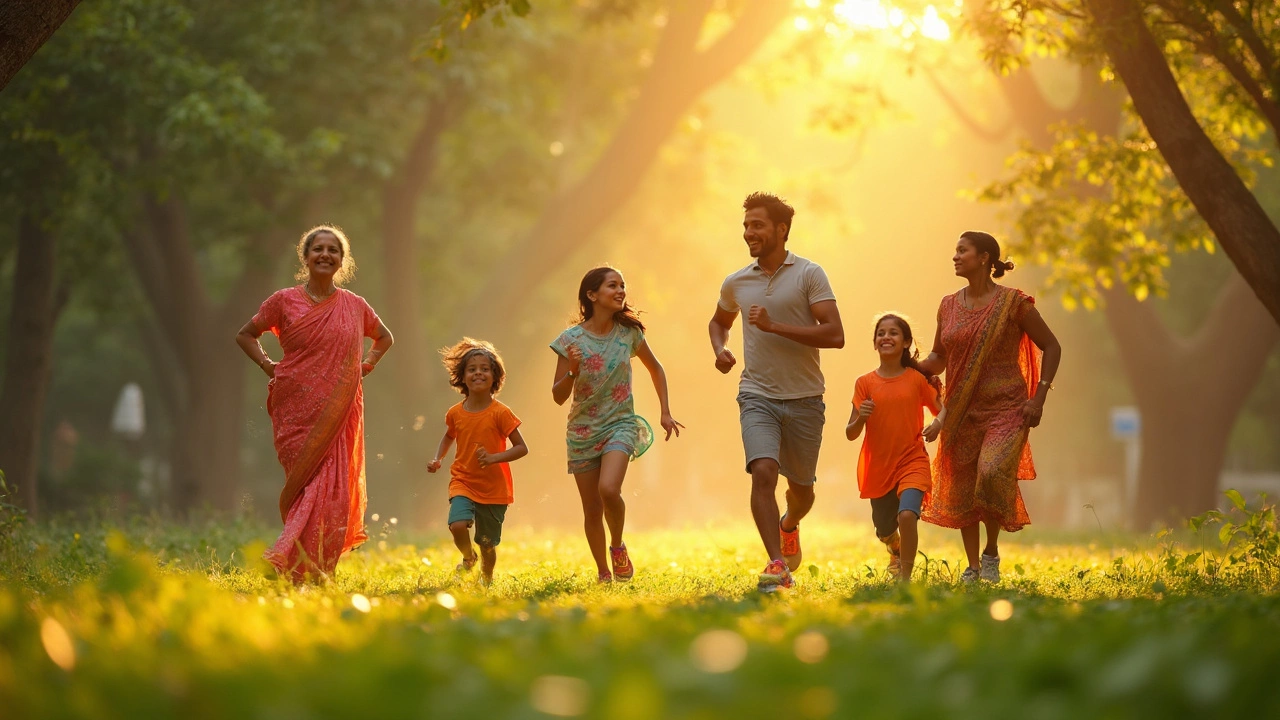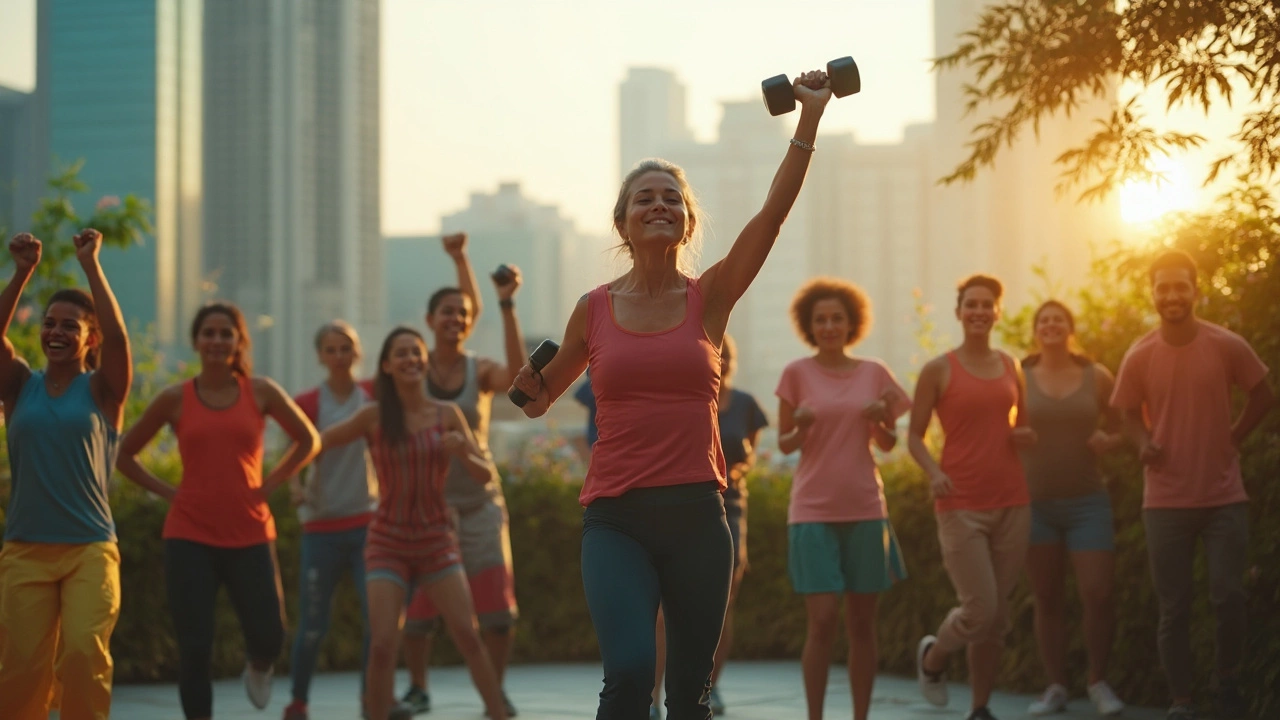Best Anti-Aging Exercises for Longevity and Youthful Energy
 Jun, 30 2025
Jun, 30 2025
If someone told you a single habit could help you move like you're decades younger, sharpen your brain, and might even keep you around for more birthdays with your family—would you really hit snooze again on your morning workout? There’s always that quest for a magic anti-aging bullet, but study after study keeps pointing back to something wild: the best anti-aging weapon is free, and it’s hiding in your daily routine (or, maybe, in your dog’s excited yelps at walk time). Turns out, the true fountain of youth involves getting up and moving, but which exercise does the most heavy lifting for your body, mind, and spirit as time ticks on?
How Exercise Battles the Clock: The Science of Staying Young
Aging isn’t just about counting candles; it’s a real, biological process. But get this: exercise literally slows the steps of time inside your cells. The secret is in your DNA’s end caps—called telomeres. These little shoelace tips get shorter as you age, but research from the University of Leipzig and others has found that people who regularly exercise (especially aerobic workouts) have longer telomeres. What does that mean for you? Longer telomeres equal slower cellular aging, translating into more years keeping up with your kids, grandkids, or yes, clowning around with a goofy Goldendoodle named Charlie.
But it’s not all microscopic. Exercise gives visible, stubbornly impressive benefits. Your skin glows (thank you, improved collagen and circulation), your muscles stay strong enough to tote groceries or pick up a snoozing Sadie, and your joints ache a whole lot less. There’s a mountain of data showing that regular movement keeps both body fat and chronic disease risks lower—think diabetes, heart attack, stroke, and even a few types of cancer shrink in probability when you stay active. So, the next piece: which workout is best?
Aerobic Exercise: The Longevity Heavyweight
This is where things get spicy. You’ve heard of walking, running, swimming, cycling—they all fall under aerobic exercise, or “cardio.” Multiple Harvard longevity studies zeroed in on aerobic activity, and the numbers are impossible to ignore. Regular brisk walking can reduce the risk of dying early by up to 30%. Not only does cardio boost telomeres, but it also helps your heart grow younger in a very real sense. Aerobic workouts open up blood vessels, lower inflammation, and slay cholesterol in its tracks. Want specifics? A landmark 2023 JAMA study tracked 120,000 people and found that walkers and cyclists enjoyed more “disease-free years” than those who skipped out. So, that silly power-walk with Charlie around your block? It’s more powerful than it looks.
The anti-aging power of aerobic exercise goes even further. It kicks your mitochondrial engines into gear (those are your cell’s energy factories), boosts oxygen delivery, and straight-up reverses some age-related memory decline. One fun, almost sneak-attack side effect? People who fit in the recommended 150 minutes of moderate cardio per week seem to have thicker, more youthful skin, and one 2021 study even found that endurance athletes had less “skin sag” in their 50s than folks who avoided sweat sessions.
You don’t have to pound out marathons. Most doctors agree that even short, regular walks are plenty for most people. If you want to rack up more years to annoy your kids, start by lacing up those sneakers three times a week. Bring a friend. Talk about podcasts. Or do what I do—let your pet set the pace.

Strength Training: Muscle—the Other Anti-Aging Elixir
This one sometimes gets left out of the anti-aging conversation because it’s not as flashy as cardio, but skip strength training at your own risk. Here’s why: after age 35, most adults lose about 3-5% of muscle mass per decade. Muscles aren’t just for flexing—strong legs and arms mean fewer falls, faster recovery from illness, and the independence to live life on your own terms deep into your 80s or 90s. The CDC, the World Health Organization—yep, even my 70-year-old mom—all agree adults should aim for muscle-building activity at least twice a week.
The impact is huge. Duke University’s 2022 analysis showed that people who combined moderate strength training with gentle cardio lost more belly fat, reduced blood sugar spikes, and had sharper mental powers vs. either exercise alone. Even better—the muscle you build sticks around, burning more energy even when you’re chilling with a glass of wine after dinner. Senior athletes who lift weights show brain changes similar to people decades younger, thanks to new neural pathways and increased blood flow.
You don’t need a fancy gym or intimidating dumbbells. Bodyweight moves like squats, push-ups, resistance bands, lifting your toddler, or carrying Charlie’s never-ending supply of toys up the stairs all count. It’s the consistency that works magic. Don’t skip leg day—or arm day. Your future self will thank you.
The Hidden Players: Mobility, Balance, and the Mind-Body Connection
Okay, so you’ve sweat through your cardio and finished your strength reps. Want to really crank up your anti-aging game? It’s time for the hidden heroes: flexibility, balance, and the mind-body element. Think yoga, Tai Chi, stretching flows, or even balance drills you can do in your pajamas while the coffee brews.
Why does this matter? As we age, falling becomes a real risk. The CDC estimates 36 million older Americans fall every year, and broken hips are no joke. Regular yoga or balance training can cut fall risk up to 45%. Harvard research from 2021 points out that people who commit to just 10-15 minutes of daily balance training have fewer hospitalizations and stay independent longer. Plus, mind-body practices help keep stress hormones like cortisol in check, which is basically like rolling back a bit of your body’s time clock every single day. (Bonus: if you meditate or do gentle yoga together as a family, the grumpiness level before school or bedtime often drops by half—my house is living proof.)
Focusing on these areas works wonders for mental health, too. The lower stress, reduced anxiety, and sharper memory aren’t just nice side effects. They’re direct anti-aging superpowers. Getting older is inevitable. Feeling older? That’s optional. I’ll bet my next coffee run with Charlie that your future self would beg for you to start your daily stretches today.
